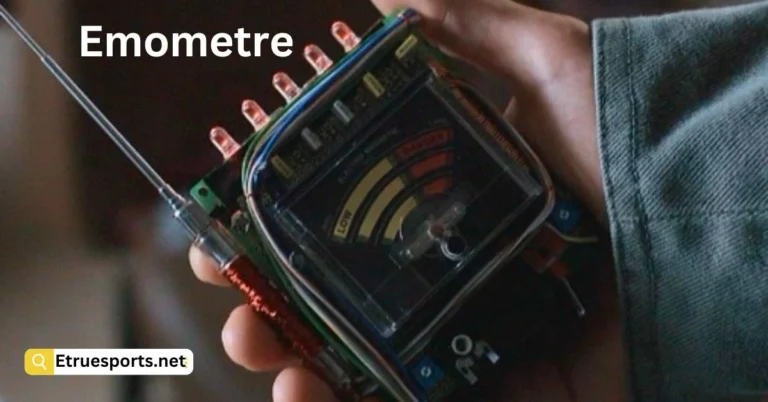Emotions are a fundamental part of human experience. They shape our interactions, influence our decisions, and impact our overall well-being. But how can we measure emotions? Enter Emometre—a tool designed to quantify and track emotions in a way that allows us to better understand and manage them. In this comprehensive guide, we’ll explore the Emometre, how it works, its significance, and how it can be utilized in various fields.
What is Emometre?
The Emometre is an innovative tool used to measure and analyze emotional states. It operates on the principle of detecting and quantifying physiological and psychological indicators that correspond to different emotional responses. Emotions such as happiness, anger, fear, sadness, and excitement are translated into measurable data points, which can then be used to create a clearer understanding of emotional health.
How Does Emometre Work?
The Emometre operates by capturing data from a range of sources, including facial expressions, heart rate, skin conductance, and brain activity. By analyzing these biological markers, the device identifies patterns that correlate with specific emotions. It’s algorithms process this data in real-time, providing users with immediate feedback on their emotional state.
Why is Measuring Emotions Important?
Understanding emotions is crucial for both personal development and improving mental health. By measuring emotions accurately, individuals can identify triggers, recognize patterns in their emotional responses, and make informed decisions about managing stress, anxiety, and other emotional challenges. It provides a scientific approach to emotional awareness, bridging the gap between subjective feelings and objective data.
Applications of Emometre
The use of it extends beyond personal development. Its application has grown in various sectors, from healthcare to business and education. Let’s dive into some of the key areas where it has proven to be particularly valuable.
Healthcare and Therapy
In healthcare, particularly in mental health therapy, it provides therapists and patients with a clear picture of emotional fluctuations during treatment sessions. Therapists can use the data to track progress, understand emotional triggers, and tailor treatments based on real-time feedback.
Emometre in Cognitive Behavioral Therapy (CBT)
In Cognitive Behavioral Therapy, a popular treatment for anxiety and depression, it can assist therapists by quantifying the intensity of emotions related to specific thoughts. This data helps in designing more effective coping strategies for patients, making therapy more personalized.
Workplace and Business Settings
Emotions play a vital role in workplace dynamics, influencing productivity, decision-making, and interpersonal relationships. It can be used in business settings to gauge employee morale, stress levels, and overall emotional well-being.
Enhancing Workplace Productivity
By using the Emometre, employers can monitor emotional states that affect performance. For example, detecting high levels of stress or frustration in employees may prompt immediate interventions, such as stress-relief programs or counseling, leading to improved productivity and a healthier work environment.
Education and Learning Environments

Emotions have a direct impact on learning. Positive emotions like excitement and curiosity enhance learning, while negative emotions like anxiety and frustration can hinder it. Teachers and educators can use it to track students’ emotional engagement during lessons.
Emotional Intelligence in Classrooms
It can be integrated into classrooms to help educators promote emotional intelligence among students. By understanding their emotions better, students can improve their self-regulation, empathy, and social interactions, fostering a more emotionally intelligent generation.
Marketing and Consumer Behavior
Understanding consumer emotions is key to successful marketing. It can help businesses analyze how customers emotionally respond to advertisements, products, and services. This data enables companies to fine-tune their marketing strategies to evoke the desired emotional responses from their target audience.
Emotional Branding
Emotional branding relies on creating strong emotional connections between brands and consumers. The Emometre helps businesses assess the emotional impact of their branding efforts, ensuring that their marketing campaigns resonate emotionally with customers.
Benefits of Using Emometre
The Emometre offers several benefits, making it a valuable tool for individuals and organizations alike. Here are some of the key advantages:
Increased Emotional Awareness
The Emometre encourages users to become more aware of their emotional states. By providing real-time data on emotional responses, users can reflect on their emotions, identify patterns, and take steps to manage negative emotions more effectively.
Objective Emotional Data
Emotions are often seen as subjective experiences, but the Emometre provides objective data that quantifies these experiences. This data-driven approach allows individuals to measure emotions in a way that removes personal bias.
Improved Decision Making
With a clearer understanding of emotional triggers and patterns, individuals can make more informed decisions, whether in their personal lives or professional settings. Emotional regulation becomes easier, leading to better choices and improved outcomes.
Enhanced Mental Health Monitoring
For those dealing with mental health issues such as anxiety, depression, or stress, the Emometre can provide an additional layer of support. By tracking emotional states over time, users and therapists can spot early signs of emotional distress and intervene before problems escalate.
Limitations and Ethical Considerations of Emometre
While the Emometre presents a range of benefits, it is not without its limitations and ethical concerns. Here are some key points to consider:
Privacy Concerns
The collection and analysis of emotional data raise concerns about privacy. Emotional data is deeply personal, and improper handling or sharing of this information could lead to misuse or exploitation. It’s important for companies developing and using the Emometre to prioritize data protection and ensure users’ privacy is maintained.
Accuracy of Emotional Measurements
Though the Emometre offers a scientific way to measure emotions, it is not always 100% accurate. Emotions are complex and can be influenced by various factors, making it challenging to capture them entirely through physiological and psychological data alone.
Over-Reliance on Technology
There is a risk that individuals may become too reliant on the Emometre for emotional understanding, potentially losing touch with their natural ability to recognize and interpret emotions without technological assistance. While the Emometre can be a helpful tool, it should be used as a complement to, rather than a replacement for, traditional emotional self-awareness practices.
The Future of Emometre Technology

As technology continues to evolve, so too will the capabilities of the Emometre. Future developments may include more sophisticated algorithms, increased accuracy, and a wider range of applications. Here’s a glimpse into the future of Emometre technology.
Artificial Intelligence and Machine Learning Integration
The integration of artificial intelligence (AI) and machine learning with the Emometre could greatly enhance its ability to detect subtle emotional changes and predict emotional patterns over time. AI could also personalize the user experience by learning individual emotional baselines and offering tailored emotional management strategies.
Wearable Emometre Devices
In the future, Emometres may become more portable and accessible through wearable technology. Wearable Emometres could track emotions throughout the day, providing users with continuous feedback and helping them manage emotions in real-time.
Virtual and Augmented Reality Applications
The Emometre could be integrated into virtual reality (VR) and augmented reality (AR) platforms to create immersive emotional experiences. This could revolutionize fields such as therapy, education, and entertainment, allowing users to engage with their emotions in entirely new ways.
How to Get Started with Emometre
If you’re interested in using the Emometre to measure and manage your emotions, here’s how you can get started:
Choose the Right Emometre Device
There are several Emometre devices on the market, each with varying features and capabilities. Research different options to find one that meets your needs, whether for personal use, therapy, or professional settings.
Set Clear Emotional Goals
Before using the Emometre, it’s important to set clear goals. Do you want to reduce stress? Improve emotional awareness? Track emotional responses to specific triggers? By setting goals, you can use it more effectively to achieve your desired outcomes.
Integrate Emometre into Daily Life
For the best results, incorporate it into your daily routine. Use it during moments of high emotional intensity, such as stressful work situations or challenging social interactions, to gain a clearer understanding of your emotional responses.
Review and Reflect on Emotional Data
Regularly review the emotional data collected by the Emometre. Reflect on patterns and trends in your emotions and use this information to make positive changes in your emotional regulation and overall mental health.
FAQs
1. Is the Emometre accurate in measuring emotions?
The Emometre uses physiological and psychological data to estimate emotional states, but like any tool, it has its limitations. While it provides valuable insights, it may not capture every nuance of complex emotional experiences.
2. Can I use the Emometre without any professional guidance?
Yes, it can be used independently, but if you’re dealing with mental health challenges, it’s recommended to consult with a healthcare professional to interpret the data and develop effective emotional management strategies.
3. Are there any privacy concerns with using the Emometre?
Yes, privacy is a concern when using any device that collects personal data. Ensure that the Emometre you choose has strong privacy policies in place and that your emotional data is stored securely.
4. Can businesses benefit from using the Emometre?
Absolutely. Businesses can use the Emometre to monitor employee well-being, improve workplace morale, and tailor marketing strategies based on consumer emotional responses.
5. What is the future of Emometre technology?
The future of Emometre technology includes advancements in AI, wearable devices, and VR/AR applications. These developments will expand the Emometre’s capabilities and open up new possibilities for emotional measurement and management.
Conclusion
The Emometre is an exciting tool that brings a new dimension to understanding and managing emotions. By translating emotional experiences into measurable data, it opens up opportunities for personal development, enhanced mental health care, and improved emotional intelligence in various fields. As technology advances, it will continue to evolve, offering even greater accuracy and versatility in measuring the complex world of human emotions. Embracing this technology could be the key to unlocking deeper emotional awareness and well-being in our daily lives.
Read More: Exploring the Features and Benefits of the fmovies App








